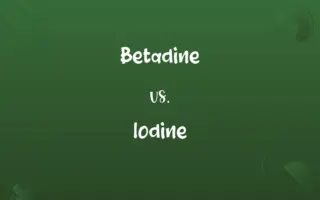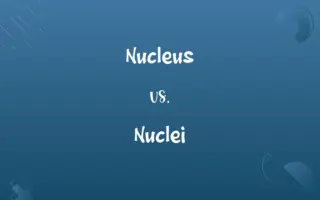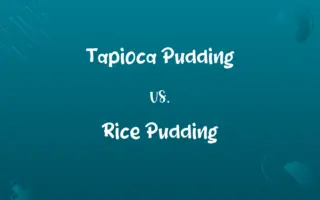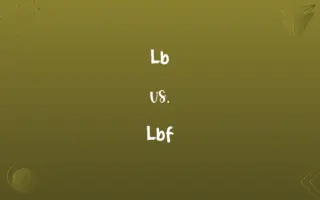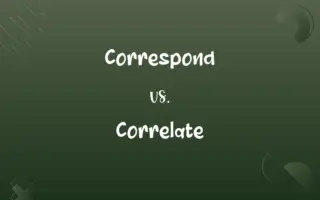Conductors vs. Insulators: Know the Difference

By Shumaila Saeed || Published on January 4, 2024
Conductors allow easy flow of electricity and heat due to free electrons, while insulators resist this flow, having tightly bound electrons.

Key Differences
Conductors are materials that allow electricity and heat to pass through them easily, due to their free-moving electrons. Insulators, in contrast, have tightly bound electrons, preventing the easy flow of electricity and heat.
Shumaila Saeed
Jan 04, 2024
Conductors, like copper and aluminum, are often used in electrical wiring due to their high electrical conductivity. Insulators such as rubber and glass are used to coat or surround conductors to prevent electrical accidents.
Shumaila Saeed
Jan 04, 2024
In conductors, the atoms have loosely held electrons that can move freely, facilitating the flow of current. Insulators have electrons that are tightly bound to their atoms, making them poor conductors of electricity.
Shumaila Saeed
Jan 04, 2024
Conductors are typically metals or metal alloys, and their ability to transfer heat makes them useful in cooking utensils. Insulators, being poor conductors of heat, are used in thermal insulation materials.
Shumaila Saeed
Jan 04, 2024
Conductors can become charged by conduction, gaining or losing electrons easily. Insulators, however, do not easily transfer charge and are used in static charge applications.
Shumaila Saeed
Jan 04, 2024
ADVERTISEMENT
Comparison Chart
Electrical Conductivity
High; allow easy flow of electricity
Low; resist flow of electricity
Shumaila Saeed
Jan 04, 2024
ADVERTISEMENT
Reactivity
Can oxidize or corrode in certain cases
Typically more resistant to corrosion
Shumaila Saeed
Jan 04, 2024
ADVERTISEMENT
Conductors and Insulators Definitions
Conductors
A substance that transfers heat readily.
Iron is a good conductor of heat, making it useful for cookware.
Shumaila Saeed
Dec 20, 2023
Insulators
A material that resists the flow of electric charge.
Plastic is commonly used as an insulator in electronic devices.
Shumaila Saeed
Dec 20, 2023
Conductors
A material that allows the flow of electric charge.
Copper wires are used as conductors in electrical cables.
Shumaila Saeed
Dec 20, 2023
Insulators
A protective covering to prevent the passage of electricity.
Insulators are critical in preventing short circuits in electrical systems.
Shumaila Saeed
Dec 20, 2023
Conductors
A device for transmitting electrical or thermal energy.
Overhead lines act as conductors for transmitting electricity.
Shumaila Saeed
Dec 20, 2023
Insulators
A device or material that inhibits the loss of heat.
Insulators in the walls help maintain the house's temperature.
Shumaila Saeed
Dec 20, 2023
Conductors
A guide or leader.
As a tour conductor, she introduced the group to various historical sites.
Shumaila Saeed
Dec 20, 2023
Insulators
A material used to prevent the transfer of electricity.
Rubber gloves serve as insulators for electricians.
Shumaila Saeed
Dec 20, 2023
Conductors
A person who directs an orchestra or choir.
The conductor led the orchestra with great skill.
Shumaila Saeed
Dec 20, 2023
Insulators
A substance that does not conduct heat well.
Wool is a natural insulator, keeping warmth close to the body.
Shumaila Saeed
Dec 20, 2023
Insulators
A material that insulates, especially a nonconductor of sound, heat, or electricity.
Shumaila Saeed
Dec 13, 2023
Conductors
(Physics) A substance or medium that conducts heat, light, sound, or especially an electric charge.
Shumaila Saeed
Dec 13, 2023
Repeatedly Asked Queries
What is an insulator?
An insulator is a material that resists the flow of electricity or heat, having tightly bound electrons.
Shumaila Saeed
Jan 04, 2024
Can insulators conduct electricity under any condition?
Insulators can conduct electricity under extreme conditions like high voltage, which can cause the breakdown of their insulating properties.
Shumaila Saeed
Jan 04, 2024
Are all conductors metallic?
Most conductors are metallic, but some non-metallic conductors like graphite and saline water also exist.
Shumaila Saeed
Jan 04, 2024
Why are metals good conductors?
Metals are good conductors because they have free electrons that facilitate the easy transfer of electric charge.
Shumaila Saeed
Jan 04, 2024
What are some common insulators?
Common insulators include rubber, glass, plastic, and air.
Shumaila Saeed
Jan 04, 2024
What is a conductor?
A conductor is a material that allows the easy flow of electricity or heat due to its free electrons.
Shumaila Saeed
Jan 04, 2024
How do insulators help in everyday life?
Insulators are used in various applications like electrical wiring, clothing for warmth, and home insulation.
Shumaila Saeed
Jan 04, 2024
Do insulators have any mechanical strength?
Some insulators, like ceramic, have good mechanical strength and are used in high-strength applications.
Shumaila Saeed
Jan 04, 2024
Can a conductor be used as an insulator?
No, a conductor cannot be used as an insulator due to its high electrical conductivity.
Shumaila Saeed
Jan 04, 2024
Do conductors have a high or low resistance?
Conductors have low resistance, allowing easy flow of current.
Shumaila Saeed
Jan 04, 2024
How do insulators affect the safety of electrical appliances?
Insulators enhance the safety of electrical appliances by preventing accidental electric shocks.
Shumaila Saeed
Jan 04, 2024
What is the role of a conductor in an orchestra?
In an orchestra, a conductor directs the musicians, ensuring harmonious and coordinated performance.
Shumaila Saeed
Jan 04, 2024
Can the conductivity of a conductor change?
Yes, the conductivity of a conductor can change with temperature, impurities, or physical deformation.
Shumaila Saeed
Jan 04, 2024
What role do insulators play in electrical circuits?
Insulators prevent unwanted flow of current and protect against electric shocks in electrical circuits.
Shumaila Saeed
Jan 04, 2024
What makes glass a good insulator?
Glass is a good insulator because it has tightly bound electrons that do not allow the easy flow of electricity.
Shumaila Saeed
Jan 04, 2024
Why are overhead power lines made of conductive materials?
Overhead power lines are made of conductive materials to efficiently transmit electricity over long distances.
Shumaila Saeed
Jan 04, 2024
Is water a conductor or an insulator?
Pure water is an insulator, but impure water with dissolved salts is a conductor.
Shumaila Saeed
Jan 04, 2024
Are conductors always solid?
While most conductors are solid, there are liquid and gaseous conductors as well.
Shumaila Saeed
Jan 04, 2024
Are all plastics insulators?
Most plastics are insulators, but some specially treated plastics can conduct electricity.
Shumaila Saeed
Jan 04, 2024
Can an insulator become a conductor under high pressure?
Under extremely high pressure or temperature, some insulators may become conductive.
Shumaila Saeed
Jan 04, 2024
Share this page
Link for your blog / website
HTML
Link to share via messenger
About Author
Written by
Shumaila SaeedShumaila Saeed, an expert content creator with 6 years of experience, specializes in distilling complex topics into easily digestible comparisons, shining a light on the nuances that both inform and educate readers with clarity and accuracy.

